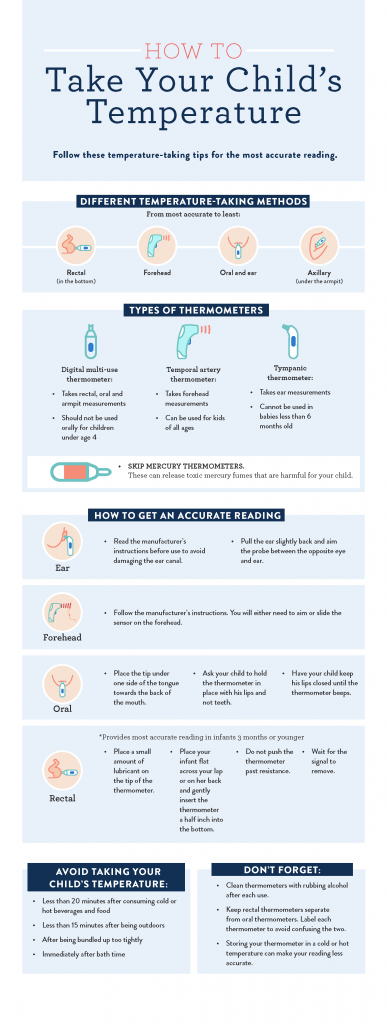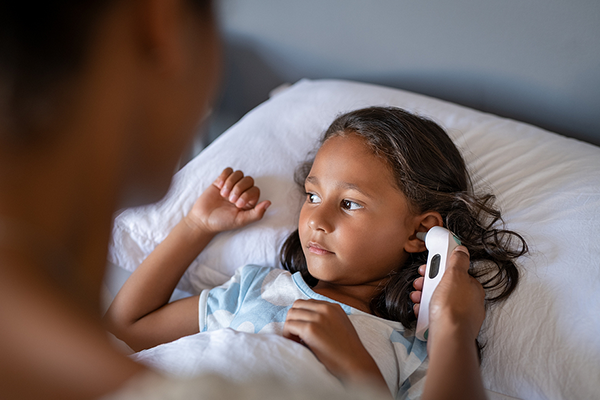Your child will likely have a fever at some point during childhood due to infection or illness. Here is what you should know about fevers and how to help when your child’s temperature is on the rise.
What Is Considered a Fever?
Your child’s body temperature should generally stay around 98.6 F. During the day, his or her temperature may fluctuate between 97.5 F and 99.5 F. Don’t be alarmed if your child’s temperature is lower in the morning and then increases at bedtime after a full day of play. This fluctuation is normal.
Your child has a fever if his temperature is at or above:
- 99 F axillary (under the arm) temperature
- 100 F oral temperature
- 100.4 F rectal (in the bottom) temperature
What Causes a Fever?
Fevers help the body get rid of bacteria or a virus that is causing an illness. Even though fevers can be scary for parents, they are a good sign your child’s immune system is properly working.
Fevers can also be caused by overdressing your child. Avoid over-layering your infant’s clothing during colder months. Babies can’t physically regulate their body temperature as well as children or adults can.
Teething can sometimes cause your baby’s temperature to be higher than normal. However, if your infant’s temperature is above 100 F, it’s probably a sign your baby is running a fever unrelated to teething.
Signs of a Fever
Along with a high temperature, here are other signs of a fever:
- Chills or sweating
- Excessive thirst
- Flushed appearance
- Headache
- Lack of appetite
- Other signs of the illness causing the fever, including sore throat, stomach pain, rash, earache and vomiting
Treating a Fever
Home Care
For healthy kids, medical treatment for a fever may not be necessary. If your child is running a low fever but otherwise feels fine, try taking measures to bring her temperature down and ensure she stays comfortable. Dress your child in lightweight clothing, provide plenty of liquids and make sure she gets plenty of rest. Do not give your child aspirin to treat a fever. Aspirin can cause serious disease in children younger than age 18.
Call Your Pediatrician
Your child may need treatment for an illness that is causing a fever. Call your child’s physician if your child has a temperature higher than 102.2°F or has a low fever but is experiencing:
- Diarrhea and vomiting
- Discomfort while urinating
- Ongoing fever (lasting 72 hours or longer)
- Pain in the throat, ear or other area of the body
- Rash
- Signs of dehydration
Get Immediate Emergency Care
Fevers can also be a sign of something more serious. If your infant is 3 months or younger and has a temperature at or above 100.4°F, call your child’s physician immediately.This can be a sign of a serious infection.
You should alsotake your child for emergency care if he experiences any of the following:
- Blue lips, tongue or nails
- Difficulty breathing
- Extreme fussiness
- Leaning forward and drooling
- Seizure
- Severe belly pain
- Severe headache
- Stiff neck





